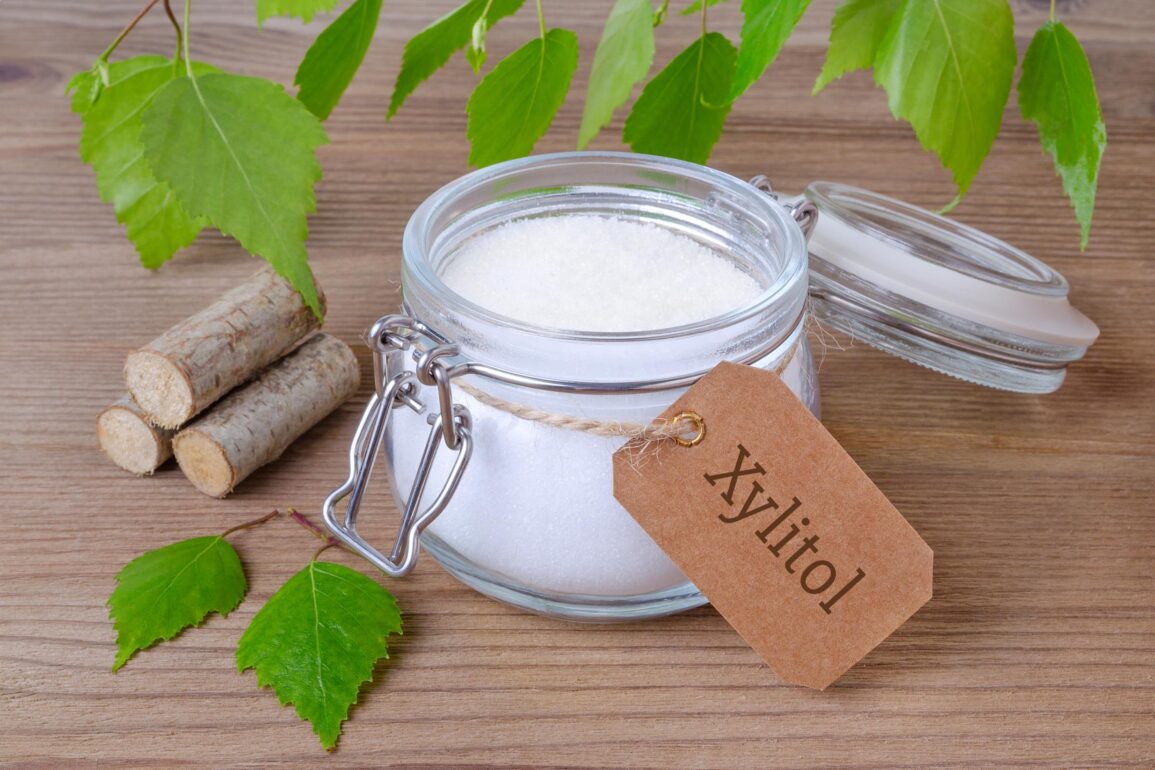Xylitol is a natural sugar alcohol that serves as a sugar substitute with various health benefits. It is derived from plants, including fruits and vegetables, and is commonly used in sugar-free products like chewing gum, mints, and candies. Xylitol has a sweet taste similar to sugar but does not cause tooth decay. It is known to reduce levels of decay-causing bacteria in saliva, prevent cavities, and inhibit the growth of harmful oral bacteria like Streptococcus mutans, which can lead to plaque and tooth decay.Furthermore, it has a low glycemic index, meaning it has minimal effects on blood sugar and insulin levels, making it a suitable alternative for individuals with diabetes, prediabetes, obesity, or other metabolic issues. Studies suggest that xylitol may improve symptoms of diabetes, reduce belly fat, and even prevent weight gain. Additionally, it is considered weight-loss-friendly as it contains fewer calories than sugar.
What is Xylitol?
Xylitol pronounced as “za-lee-toh-lee,” is a natural sugar alcohol that is gaining popularity as a healthier alternative to traditional table sugar. Derived from birch bark or corn cobs, it has a sweet taste similar to sugar but with fewer calories and less impact on blood sugar levels.
This versatile ingredient is commonly used in various food products like chewing gum, candies, and baked goods due to its ability to mimic the sweetness of sugar without harmful effects. It can also be found in oral care products like toothpaste and mouthwash for its dental benefits.
One of the standout features of Xylitol is its low glycemic index, making it a suitable option for individuals seeking blood sugar control. Additionally, it is known for its digestive-friendly properties, as it is not fully absorbed by the body which can help prevent spikes in blood glucose levels.
History Of Xylitol
Xylitol, a natural alternative to sugar, has an interesting history that dates back centuries. The origin of Xylitol can be traced to the indigenous people of South America who discovered its sweetening properties in certain plant sources.
Over time, it gained popularity due to its unique taste and health benefits compared to traditional sugars. It wasn’t until recent years that Xylitol began to gain mainstream attention as a healthier substitute for sugar.
In the modern era, the demand for natural sweeteners like Xylitol has surged as people become more health-conscious and seek alternatives to refined sugars. As research continues to uncover the potential benefits of Xylitol, its usage is expected to grow even further.
The rich history of Xylitol serves as a testament to how ancient traditions can influence present-day choices towards healthier living options.
How is Xylitol Different from Sugar?
Xylitol, a natural alternative to sugar, stands out from traditional sugar in several ways. Xylitol is extracted from birch bark or corn cobs through a natural fermentation process. On the other hand, sugar is typically refined from sugarcane or sugar beets using chemical processes.
The most significant difference between Xylitol and sugar lies in their impact on blood sugar levels. Xylitol has a low glycemic index, meaning it doesn’t cause spikes in blood glucose levels like sugar does. This makes it an ideal sweetener for individuals with diabetes or those looking to manage their blood sugar levels.
Moreover, it provides fewer calories than traditional sugar while still offering a similar sweetness level. It also doesn’t contribute to tooth decay as much as regular sugar does, making it a healthier option for dental health.
In terms of taste, it has a refreshing cool sensation compared to the intense sweetness of regular sugar. This unique quality can add depth to various recipes without overpowering other flavors present.
Health Benefits of Xylitol
Looking for a natural sweetener that not only satisfies your taste buds but also has health benefits? Enter Xylitol. This incredible sugar alternative is known for its ability to provide sweetness without the negative effects of traditional sugar.
One of the key health benefits of Xylitol is its low glycemic index, making it a suitable option for individuals looking to manage their blood sugar levels. It doesn’t cause spikes in blood glucose, which can be beneficial for those with diabetes or insulin resistance.
Moreover, it has been shown to promote dental health by reducing the growth of cavity-causing bacteria in the mouth. Say goodbye to tooth decay while still enjoying a hint of sweetness in your favorite beverages and treats.
Additionally, this natural sweetener has fewer calories than sugar, making it a great choice for those watching their calorie intake. You can indulge in delicious desserts guilt-free with Xylitol as your go-to sweetening option.
Xylitol in Health and Wellness
Xylitol has been making waves in the health and wellness world as a natural alternative to sugar. This sweetener offers a guilt-free way to satisfy your cravings without compromising on taste.
When it comes to maintaining a balanced diet, it can be a game-changer for those looking to reduce their sugar intake. Its low glycemic index means that it won’t cause spikes in blood sugar levels, making it an excellent option for individuals with diabetes or those watching their weight.
Many health-conscious individuals are turning to Xylitol as part of their daily routine. Whether you’re baking up a storm in the kitchen or sweetening your morning coffee, this versatile ingredient can easily replace traditional sugar without sacrificing flavor.
Incorporating Xylitol into your diet can help support your overall well-being by reducing inflammation and promoting gut health. Plus, its dental benefits make it a preferred choice for oral hygiene compared to regular sugar.
Xylitol positive impact on health and wellness continues to solidify its reputation as a must-have pantry staple for those seeking a healthier lifestyle.
Xylitol in the Ketogenic Diet
Are you following a ketogenic diet and looking for a sugar alternative that won’t kick you out of ketosis? Xylitol might just be the solution you’ve been searching for. This natural sweetener has a low glycemic index, making it suitable for those aiming to maintain ketosis.
Xylitol can be incorporated into your favorite keto-friendly recipes without causing spikes in blood sugar levels. Whether you’re baking keto desserts or sweetening your morning coffee, it provides the sweetness you crave without jeopardizing your ketone levels.
Unlike regular sugar, it doesn’t contribute to insulin resistance or weight gain, making it an excellent choice for individuals on a ketogenic diet. Its ability to mimic the taste of sugar while supporting ketosis makes it a valuable addition to any keto pantry.
Next time you’re whipping up some keto treats, consider reaching for Xylitol as your go-to sweetener. Enjoy satisfying your sweet tooth without compromising your ketogenic goals with this versatile and beneficial alternative to sugar.
Xylitol Impact on Society
Xylitol, the natural alternative to sugar, is making waves in society for its numerous health benefits. As more people become conscious of their sugar intake and look for healthier options, it has emerged as a game-changer. Its low glycemic index makes it suitable for those with diabetes or following a low-carb diet.
Its versatility and health benefits make it a valuable addition to any pantry or kitchen. As more people incorporate Xylitol into their lives, its positive impact on society’s overall well-being continues to grow.
Side Effects and Precautions
When it comes to Xylitol, there are a few side effects and precautions to keep in mind. Some people may experience digestive issues like bloating or diarrhea when consuming large amounts of Xylitol. It is recommended to start with small doses and gradually increase intake to allow your body to adjust.
Although Xylitol is considered safe for most people, individuals with irritable bowel syndrome (IBS) or other digestive disorders may be more sensitive to its effects. It’s best to consult with a healthcare professional before incorporating Xylitol into your diet if you have any underlying health conditions.
Additionally, pets such as dogs should not consume Xylitol as it can be toxic to them. Always store products containing Xylitol out of reach of pets and children. As with any sweetener, moderation is key in order to avoid potential side effects and maintain overall well-being while enjoying the benefits of this natural alternative.








